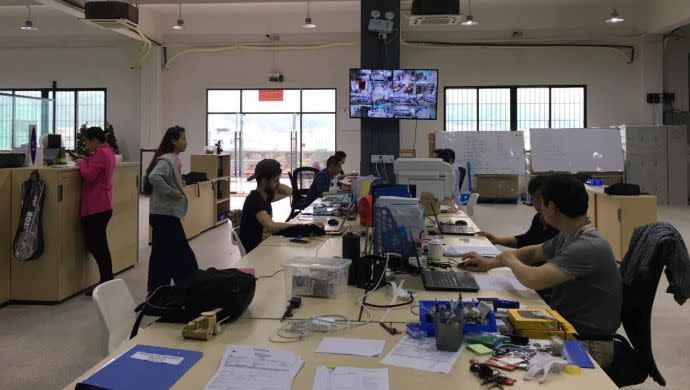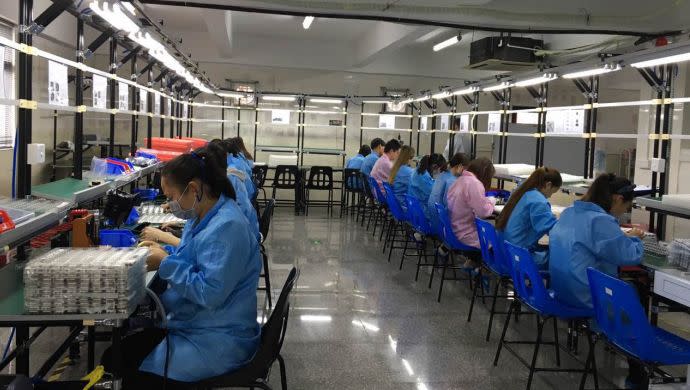Now in Shenzhen: To help painful manufacturing of crowdfunding campaigns, Uber for manufacturing comes in
Many overseas hardware startup founders contact agents who can help them find manufacturing partners or visit Shenzhen, the manufacturing hub of China
This is the first post of “Now in Shenzhen”, where TechNode visits a handful of Shenzhen-based companies leverages Shenzhen’s core strength: manufacturing.
—
If you see successfully funded consumer electronics product campaigns on Kickstarter, many have failed to deliver the product to customers because of manufacturing problems. Some backers get their money refunded, but some end up not even getting back their money.
Many overseas hardware startup founders contact Shenzhen-based agents who can help them find manufacturing partners or visit Shenzhen, the manufacturing hub of China, by themselves to find supplier and manufacturers, pitch their idea to a hardware focussed seed accelerators such as HAX, knock the doors of Seeed Studio or TroubleMaker realises their prototype. Yes, finding a Chinese factory that can actually mass manufacture in Shenzhen to manufacture your product is a pain in the ass.
“Many overseas companies come to Shenzhen and go to Trouble Maker, HAX, Dragon Innovation, and PCH International to get help on from idea to prototyping, but it’s hard to find a company that does from prototyping to mass products,” Kim Kolora Pen, founder and CEO of Workshop told TechNode.

Workshop office in Longgang, and its production line is right beside this office (Image Credit: TechNode)
Also Read: [Update] Vibease adds a new feature to help single women make their fantasies come true
Workshop helps hardware startups with manufacturing and scaling production in China. The five-month-old company started with two people in August 2016 has since grown to 53 people with a sales figure of US$400,000-500,000 every month. Now the manufacturing startup is going to open a new 2,000 square meters place to handle more clients’ request. Pen projects US$5 million in revenue this year.
The company has helped 28 startups on their production of 28 different hardware projects, mostly IoT products, such as bicycles, skateboards, massage machines, smart watches, speakers, cloud system devices, and e-cigarettes.
The startup’s name ‘Workshop’ comes from his experience in the production line of factory workshop in China.
“I used to go to workshops in Chinese factories. Many times, they couldn’t ensure quality and had no production method. Things were not in control,” Pen says. “We make sure everything is clean, and staffs are well-trained. Every process and parts are marked, and labeled.”
Why do we need Uber for manufacturing

Workshop’s 35 workers work in the product line assembling products (Image Credit: TechNode)
“Hardware startups think if they work with big name manufacturers, it will benefit fit them greatly. In fact, when startups work with big name manufacturers, they end up spending a lot of time doing paperwork,” Pen says. “Hardware startups are looking for the Uber of manufacturing, where you can mass manufacture your hardware when you need it. When clients give a call for more production, we make sure it is delivered in six months.”
In the Workshop office, there are 17 people managing the hardware project, and on the same floor, 35 workers work in the product line assembling products. Including Pen, four are French and the rest are Chinese. Chinese traditional music in the morning and disco music in the afternoon keeps the harmonious environment and to keep up with efficiency.
Also Read: How Cubeacon plans to win over Indonesian IoT scene
“I think the manufacturing unit should not go over the maximum size of 50 people, and the size of the space should be between 1,000-2,000 square meters,” Pen says.
Pen insists the importance of keeping small manufacturing unit to ensure flexibility and agile work style.
“We don’t do economy of scale. We are in the same phase as a startup when we work with them,” he says. “We work in the long term with companies, and ensure them that we get money when the hardware are actually manufactured.”
To keep the cost down, Workshop strategically based their office and factory in Longgang, which sits 45 minutes from the heart of Shenzhen, 15 minutes from Dongguan and one hour from Guangdong.
Located between industrial areas of Guangdong, the Shenzhen-based startup compares the suppliers and benchmark the competitors in production, and doesn’t invest in machines too much. Instead, they compare the price of the labour and the machine and outsource them when needed.
Ultimately, Workshop aims to be the next crowdfunding platform such as Kickstarter and Indiegogo. “I want to bridge Chinese investors with occidental startups,” Pen says.
From a factory worker, manager, consultant to be a CEO

Founder and CEO of Workshop, Kim Kolora Pen (Image Credit: TechNode)
The founder and CEO of Workshop, Pen has been in the automotive industry in US, France and China. Fifteen years ago, Pen started working in the automotive production line of Toyota in France. At the age of 33, Pen came to China as a general manager of automotive company SEGULA Technologies, managing from 450 to 990 people at a time and doing engineering consulting. During the weekend, he was working as a freelancer to help hardware startups’ matching with suppliers.
—
The article Now in Shenzhen: To help out painful manufacturing of crowdfunding campaigns, Uber for manufacturing comes in first appeared in TechNode.
Want to be part of the ecosystem?
Register for your Echelon Asia Summit access pass now! Enjoy +10% off Echelon Asia Summit Startup, Investor and Corporate passes just for being our favourite e27 reader: REGISTER NOW.
The post Now in Shenzhen: To help painful manufacturing of crowdfunding campaigns, Uber for manufacturing comes in appeared first on e27.



